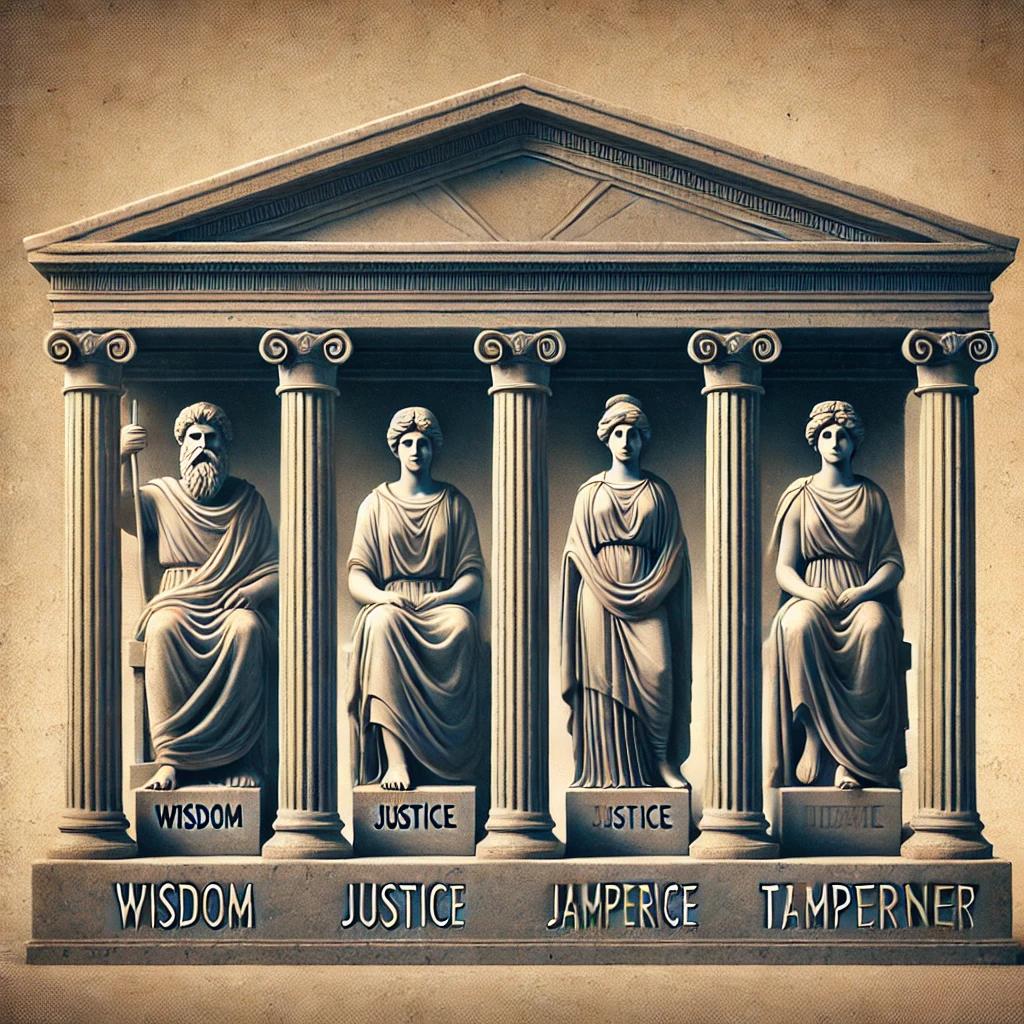Stoic Series Number 2 of 25.
“Follow where reason leads.”
— Zeno of Citium
In the Stoic tradition, few principles carry as much weight and timeless relevance as “Live according to Nature.”
This concept, often misunderstood in modern times, forms one of the foundational pillars of Stoic philosophy.
To live according to nature is to align oneself with the natural order of the universe, to act in accordance with one’s rational nature, and to recognize the inherent order in the world around us.
It’s about understanding and accepting both the limits of what we can control and the broader context of human existence.
In this post, we’ll dive deep into the Stoic interpretation of “living according to nature,” exploring its meaning, the virtues it promotes, and how to practically apply this principle in your modern life.
By the end, you’ll have a clearer understanding of how living in harmony with nature is not only a pathway to personal peace but also a guide to becoming a more grounded and fulfilled individual.
What Does It Mean to Live According to Nature?
When the Stoics speak of “living according to nature,” they aren’t merely suggesting that we spend more time outdoors or adopt environmentally friendly habits—though those can certainly be valuable.
Rather, this principle is about recognizing the natural order of life and our place within it.
To live according to nature is to live according to reason, embracing the rational part of ourselves that separates us from other beings.
The Stoics believed that human beings are unique because of their capacity for reason. While animals follow their instincts, we can think, reflect, and choose how to act based on what we know to be right.
Living according to nature also means accepting the reality of the world around us—the highs, the lows, the beauty, and the suffering.
Stoicism teaches that many things are beyond our control, but our reactions and attitudes towards them are not. Living according to nature is about learning to flow with life’s events rather than resist them.

Understanding the Rational Nature of Man
According to Stoicism, living in harmony with nature also means living in harmony with human nature.
Our capacity for reason sets us apart from other living creatures, and it is through the use of reason that we can act virtuously. But what does this mean in practice?
- Reason as Our Guide: When we make decisions based on reason rather than impulse, we align ourselves with the natural order. This rationality allows us to respond calmly to external events, whether they are favorable or not, and to always seek the most logical and ethical course of action.
- Acting with Purpose: The Stoics believed that everything in nature serves a purpose. For humans, this purpose is to live virtuously. By using our rational minds to make decisions rooted in wisdom, courage, justice, and temperance, we fulfill our role in the natural world. Every action should be deliberate and aligned with our virtues.
- Accepting the Limits of Control: To live according to nature is to recognize the things that are beyond our control—fate, the actions of others, or the inevitability of death—and to accept them without resistance. Stoicism teaches us to focus on what we can control: our thoughts, our actions, and our reactions.

The Role of Virtue in Living According to Nature
For the Stoics, virtue is not just a part of life—it is the essence of life.
To live according to nature is to live virtuously, for virtue is what allows us to align ourselves with the natural order.
The four cardinal virtues of Stoicism—wisdom, courage, justice, and temperance—guide us in this endeavor.
1. Wisdom: The Compass of Life
Wisdom helps us see things clearly, guiding us to act in accordance with what is right. It enables us to understand what is within our control and what is not, ensuring that our actions are aligned with nature.
2. Courage: Facing Life’s Challenges Head-On
Courage enables us to face life’s difficulties without fear or complaint. To live according to nature is to understand that hardships are a part of life, and we must meet them with strength and resilience.
3. Justice: Living in Harmony with Others
Justice ensures that we live not only for ourselves but also for the greater good. It is the virtue that connects us to society and reminds us that we are part of a larger whole, responsible for contributing positively to the community.
4. Temperance: Finding Balance in All Things
Temperance teaches us moderation and helps us avoid excess. Whether it’s in our desires, emotions, or actions, temperance keeps us balanced, ensuring that we live in harmony with both our internal and external worlds.

Living According to Nature in the Modern World
While the Stoic idea of living according to nature comes from ancient times, its principles are as applicable today as they were centuries ago.
In our fast-paced, high-tech world, how can we live in accordance with nature? Here are some practical ways to apply this timeless philosophy:
1. Embrace Simplicity
Modern life can often feel overwhelming with its constant demands, distractions, and pressures.
Stoicism teaches us to embrace simplicity—to focus on what truly matters and to let go of unnecessary attachments.
This could mean simplifying your possessions, minimizing distractions, or learning to be content with less.
2. Practice Mindfulness and Reflection
In a world filled with distractions, mindfulness allows us to stay present and grounded.
Taking time each day to reflect on your thoughts, actions, and decisions ensures that you are living in alignment with your true nature.
Journaling or meditating can help cultivate this habit.
3. Align Your Actions with Your Values
Living according to nature also means acting in accordance with your personal values. This could involve making career choices, setting personal boundaries, or deciding how to spend your time based on what is truly important to you.
4. Find Balance Between Work and Rest
Nature follows a cycle of activity and rest, and so should we. Avoid burnout by ensuring that you balance your hard work with adequate rest.
This balance is essential to maintaining both your physical and mental well-being.

The Benefits of Living According to Nature
Living according to nature doesn’t just lead to a more virtuous life—it leads to a more peaceful and fulfilling one. Here are some of the key benefits you can expect:
1. Inner Peace
By accepting the things we cannot control and focusing on what we can, we experience a sense of peace. We are no longer fighting against the natural order of things but instead flowing with it. This reduces anxiety and increases overall well-being.
2. Greater Resilience
When you live according to nature, you develop a deeper resilience to life’s hardships. You understand that pain, loss, and difficulty are natural parts of life, and you learn to face them with courage and composure.
3. Stronger Relationships
Living in accordance with justice ensures that we treat others with fairness and respect. This strengthens our relationships and builds a sense of trust and community with those around us.
4. Fulfillment and Purpose
By living in accordance with your rational nature and acting virtuously, you will find a deeper sense of fulfillment and purpose. You’ll know that you are living in alignment with your true self and contributing positively to the world.
Conclusion:
Living according to nature is not just a Stoic principle—it is a guide for navigating the complexities of life.
By aligning yourself with the natural order, embracing your rational nature, and acting virtuously, you can live a life of peace, purpose, and fulfillment.
This path may not always be easy, but it is one that leads to profound growth and a deeper connection with both yourself and the world around you.
As you continue on your Stoic journey, remember that living according to nature is about finding balance, accepting what you cannot control, and making deliberate choices based on reason and virtue.
By following this path, you’ll find that you are not only more resilient in the face of life’s challenges but also more content and at peace with yourself.
Be sure to read my Why Stoicism is Essential for the Fatherless Man series here. This blog post has been post number two of the series.


